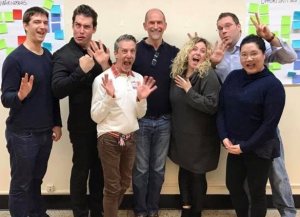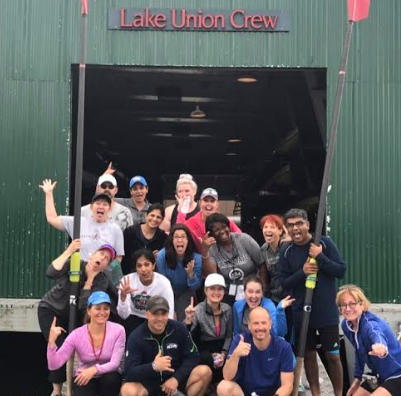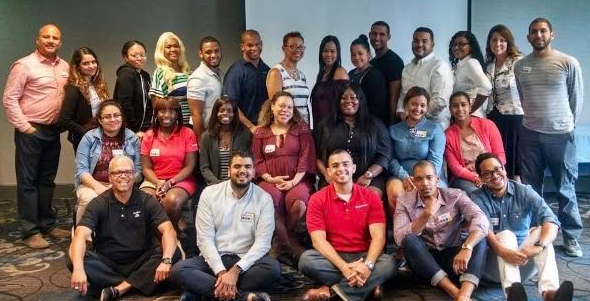Your Year-end planning meetings:
The importance of doing them NOW! (And some simple methods to make it easy and fun)

It’s planning season! Don’t you just love this time of year!?
For some, this is a beautiful reflective time, looking back at the accomplishments of the past year and dreaming of the possibilities of a new year ahead, harvesting all of the hard work that you’ve put into your business and enjoying the fruits of your success…
And for others, this is a “butt’s on fire! Scramble! Push-through-til-we-hit-our-target” frenzied time of year, wishing we would have accomplished more in the first half of the year so that the final quarter wasn’t so pressed. Sigh.
Here’s the deal: Regardless of your situation NOW, the new year will be here before you know it! And if you wait until the new year has already started to do your planning, it will be too late!!
The importance of a year-end team meeting…
One of the most important things to remember about a year-end team meeting is that it absolutely MUST create some motivation for the coming year! An event like this cannot just be a status meeting focused on the current state of business that the company is in, especially if it is a bad one, or if you are falling short of hitting your targets. It needs to inspire, engage and focus on the future.
In this blog post I want to provide you with some simple ideas that will make the planning process easy and fun with your team! You don’t have to do it alone, and you also don’t need to invest a lot of time or money to make a big impact.
Tying the meeting together with company values
I’ve learned the most important and simple thing to consider when planning an offsite meeting of any kind for your team is aligning the meeting with your company values. In my Managing For Performance Leadership Program, one of the most powerful exercises I do with my client teams is taking them through a Culture Exercise, where the team works together to create a Culture Statement for their business. For many, this acts as a Mission Statement, a structured outline for what the business stands for, identifying their values, their beliefs, and their mission.
Some of the values that I have seen articulated in this group exercise are
- “team work”
- “collaboration”
- “trust”
- “transparency”
- “work-life balance”
- “Quality” and “Excellence”.
How does this help you in planning your year-end meeting? Let me give you some examples:
- If one of your team’s core values is teamwork or collaboration, then conduct a pre-meeting survey and decide together what needs to be included in the year-end planning meeting. At the event, make sure everyone has a role to play.
 If Quality or Excellence are core values of your business, then don’t go cheap! Do it well or don’t do it at all. Be creative and bring in a speaker or hire a facilitator, make sure it’s a quality event.
If Quality or Excellence are core values of your business, then don’t go cheap! Do it well or don’t do it at all. Be creative and bring in a speaker or hire a facilitator, make sure it’s a quality event.- If work-life balance is a core value, then don’t schedule an evening or weekend meeting (unless the entire group wants to get away together for a night or day)
 If one of your team’s core values is fun or positive environment, make sure the atmosphere is inviting and the dress code is relaxed. Provide some entertainment and something fun to do after the event rather than a formal sit-down dinner.
If one of your team’s core values is fun or positive environment, make sure the atmosphere is inviting and the dress code is relaxed. Provide some entertainment and something fun to do after the event rather than a formal sit-down dinner.- And if one of your core values is trust or transparency, be prepared to talk about the imperfect current situation. Discuss Action Plans for making change. And share strategies for creating a better future situation together by the end of next year (which sets as a counterbalance to your imperfect current situation!)
Pulling it together: Essential elements to consider when planning the event
Let’s face it, it’s not easy to pull your entire team away from the business for a day (or even a half-day), so you need to make this time together count.
Through many years of trial and error, facilitating outstanding events and also getting fired by a client, I’ve learned some valuable lessons about planning effective, relevant meetings. I’ve narrowed it down to 5 essential elements that need to be addressed before your team shows up to the table with you:
- Clarify the Purpose, the “why”
No one has time to waste in an unproductive meeting. A few questions you can ask yourself prior to the planning process are, “What is my intended outcome? What am I trying to accomplish? Why do I need to put people in a room together?”
If you can clearly articulate your “why”, it removes the mystery and improves the buy-in for everyone you are inviting to attend. There’s no room for ambiguity here, especially for the Fact Finders of the world. Your team members will ask themselves, “Why are we having this meeting? What’s in it for me if I attend? And How do I need to prepare?” The more prepared everyone on the team is, the more productive your meeting will be. And if you are closing the office or slowing down production for a day, you better be sure to leverage your time together!
- Identify The Process
This isn’t about inviting spectators, it’s about inviting players. And when you have a creative, resourceful and talented team in place, you need to leverage that talent and engage them in the planning process.

One very effective thing I like doing is conducting an employee survey prior to putting the Agenda together. Gathering feedback from the team about positive aspects that are working in the business, areas where the team and business is getting “stuck”, along with suggestions for organizational change, are powerful. When I distribute surveys like this I look for themes and hot topics that are showing up that need to be addressed. This feedback will guide you in designing a perfect day filled with content that is relevant to the team. The planning meeting is an ideal time to address some of these critical issues.
Will you prepare a team meeting binder or folder, organized for the meeting Agenda? Or will you bring handouts and deliver them as you go?
Other things to consider for the process will include an Agenda and how you will take minutes or notes. Will you need technology for presentation slides? Or will you go low-tech, high-touch? Will different team members lead specific parts of the meeting? Who has ownership of what? Assigning tasks to everyone on the team creates an element of inclusion and engagement, and can make for a seamless, fun process for you as the meeting planner and/or facilitator.
- Provide relevant Content
Pre-meeting surveys will provide a laundry list of relevant content ideas, and generally using this information will create the most engagement from the team. After all, they came up with the issues and items that they want to discuss! Do what you can to build this into your Agenda. Team members love reviewing their team survey results, and it shows that you care about their input.
Other vital components to planning meeting content should include:
 Highlights from the past year
Highlights from the past year- Acknowledgement for results achieved and results not realized
- Milestones reached or internal initiatives created that serve the company’s foundation (such as new processes or systems implemented, or a refined org chart, etc.)
- Vision mapping and/or “Scorecard” goals for the new year
- SMART goals for individual and group targets that need to be addressed in the new year: identifying what the team needs to START, STOP and CONTINUE doing to impact results
Many of the groups I work with also use this time to review their talent profiles and discuss roles and responsibilities for the business, assigning ownership over specific aspects of the business and identifying talent “gaps” that need to be addressed in the new year. These conversations can greatly impact your recruiting and training initiatives and help to identify priorities around team talent needs.
- Meeting Management
Leveraging your time together is a critical component of an effective year-end planning meeting. Where many teams get in trouble is trying to cram too many items into the Agenda, and not leaving enough time for creative sharing and problem solving.
The best way I have found to stay on track is to have a detailed agenda with ample time assigned to each item listed, and an assigned “time keeper” in the group to watch the clock and keep the team on track. Free-flowing meetings can be fun if you are brainstorming, but your year-end planning meeting requires much tighter management.
 Will you have flip charts, white boards, large post-it notes for the wall? How will you manage the content and keep minutes? Will you have an assigned scribe, or take turns tracking the data? These are important topics to discuss and plan out before the meeting begins to ensure you capture all that comes out of the shared dialogue.
Will you have flip charts, white boards, large post-it notes for the wall? How will you manage the content and keep minutes? Will you have an assigned scribe, or take turns tracking the data? These are important topics to discuss and plan out before the meeting begins to ensure you capture all that comes out of the shared dialogue.
Avoid getting distracted by side issues, and establish a “parking lot” so people can write topics or issues down that are important, but can’t be tackled today. One way to do this is to have a large sticky-pad hanging on the wall that you label “PARKING LOT”, where important items can be added as they come up, but time doesn’t allow you to address “right now”. Teams love “parking lots”, as it gives them a place to park their issue or idea and can visibly see it in writing, intended for later discussion and not lost in the notepad amidst other scribbled notes. This process ultimately establishes a “to do” list for the business, with items that can be added to future team meetings as needed. This is a structure that works, and helps to manage the meeting.
- Environment

This is a big one! Moving the furniture out of the large closet in the back of the office so you can use that space for your year-end planning meeting is not only drab and depressing, it’s creative-mind stifling! There is no time like planning season to get off campus and remove your entire team from the office environment so they can breathe some fresh air, take in a change of scenery, relax, enjoy each other, and have some fun!
You don’t need to spend a lot of money, either. Many hotels and restaurants have private meeting spaces that are free if you order a catered meal. Several non-profit organizations have conference rooms that you can borrow. The library often has rooms for a nominal rent by the hour. Get creative! But PLEASE get your team away from their desks, the phones and walk-in traffic, and their routine.
Things to consider are:
 Seating arrangements: Will there be 1 large round table or a u-shaped table, so everyone can see each other and interact?
Seating arrangements: Will there be 1 large round table or a u-shaped table, so everyone can see each other and interact?- Can you close the door so you aren’t distracted?
- Is there wall space to fill with your large sticky note pads, posters and creative visuals?
- Do you need tech support for a screen, projector, audio/visual?
- Is the meeting space roomy and inspiring, with windows that bring in nature, or provide opportunities to get up and walk around when the team needs a break?
- Is there food on-site, bathrooms close by, internet connections for break time if needed?
Planning ahead for an inspiring meeting space that accommodates your needs is vital to feeling energized and creative, which is precisely why you’re meeting!
ENGAGE! LEAD! INSPIRE!
The year-end planning meeting is the perfect opportunity to spend valuable time with your people. Show them that you care and are committed to the wellbeing of the business by planning a thoughtful, engaging and fun day together. If you and your team can step away feeling more inspired and aligned with a purposeful vision, you will be grateful for the time you invested in the planning process. And you will realize, once again, the value of having a talented and resourceful team that serves as a business partner to you, rather than a team of employees. It’s freeing. And a whole lot easier to run your business when you realize you don’t have to do it alone.
For customized planning meeting support or a simple conversation with Theresa Callahan about your specific needs, contact Theresa directly at: TC@TheresaCallahan.com